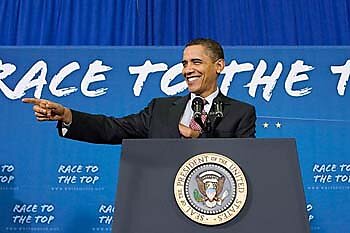Adopting national curriculum standards — the so-called “Common Core” — is voluntary for states. That is what we’ve long been told, and that is what the text of a new report looking at implementation of the standards repeats. But within that report is powerful evidence of how involuntary and federally led Common Core adoption has truly been.
According to the report, which furnishes results of a November 2010 survey of state education officials, the vast majority of states that had adopted the Common Core as of November had done so at least in part because of “the possible effect” of doing so “on success of our Race to the Top application.” Race to the Top, you might recall, was a $4.35 billion federal contest for education funding, and to maximize their chances of winning states had to adopt national standards.
The report tries to downplay this revelatory finding by emphasizing that a slightly larger number of states — 36 versus 30 — cited “the rigor” of the Common Core in their adoption decisions. But what state education official is going to say that adoption was only about money and not also at least some educational considerations? On the flip side, that officials in any, much less thirty, states were willing to concede the importance of ugly federal-dollar chasing says a ton. In particular, it says what reasonable observers have been stating all along: National standards have largely been bought by Washington, not “voluntarily” adopted by states.

